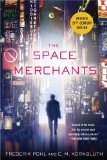
![]() The Space Merchants by Frederik Pohl & Cyril M. Kornbluth
The Space Merchants by Frederik Pohl & Cyril M. Kornbluth
It is pretty obvious that the debasement of the human mind caused by a constant flow of fraudulent advertising is no trivial thing. There is more than one way to conquer a country. ~Raymond Chandler
I read The Space Merchants, a classic science fiction satire about advertising and consumerism run rampant in a future world, before my sister got me to watch the popular cable TV show Mad Men, which was a shame in a way, since the show set in the 1950’s-60’s era of advertising run amok has a lot in common with the world predicted by Frederik Pohl and Cyril Kornbluth.
As Pohl actually worked in the advertising business for several years while researching and working on the novel (Kornbluth would collaborate with him later in its development), one could probably say that the real world advertising executives of the “Mad Men” era would seem to have been the inspiration for main character Mitch Courtenay and his superiors and co-workers at the Fowler Schocken corporation. The Fowler Schocken corp is a multi-national advertising conglomerate that will go to any lengths to defeat its rivals, up to and including buying off national governments and political leaders (who have become mere figureheads in most cases), surreptitiously putting addictive substances in products so that the masses will be more inclined to buy them, and even assassination of rivals if necessary (which can be done in legal manner if all the paperwork is done and the rules followed).
At the beginning of The Space Merchants, the world has become vastly overpopulated, and the gap between the upper classes and lower classes has become huge. However the resultant lack of living room and resources make even life for the “well off” a far cry from the comparative age of abundance in which the novel was written. As just one example, personal transportation for even the upper classes in most cases is a human propelled rickshaw, while a two room apartment is considered the height of luxury, and even that is far out of reach for most people.
The story starts with Courtenay getting what he believes is the account of a lifetime — the contract for the new Venus settlement project, which proposes re-location of large groups of people to the surface of Venus to live in earth conditioned small domes while the planet is slowly terra-formed to eventually make the outside habitable. It will be generations before Venus is finished, but if the project is pitched just right, the idea might appeal to much of the poorer population of this dystopian Earth. Hence the job for Courtenay and his team. To complicate matters, there is a dissident radical group in this society of consumers — the “consies,” short for conservationists — who are considered as akin to our present day terrorists, or, in the time of Pohl and Kornbluth, the ever lurking Communists. (Remember this book was written at the height of the McCarthy era and the authors were satirizing much of what they saw as wrong with their current society.)
After achieving what he believes is the pinnacle of success, Courtenay’s life and circumstances change drastically when his identity is stolen and he is shanghaied and put in a factory. The plight of the worker in this world is very similar to the historical system of peonage in that the harder one works, the more one gets in debt to the company or organization for which one labors. Determined to escape this caste system, Courtenay joins an underground consie group in an attempt to use his well-honed communication and manipulation skills to move up in the revolutionary group. I particularly liked the way that the story used his descent to show the plight of the lower classes as well as the methods of production in this resource-strapped future.
The Space Merchants isn’t perfect. Some of the ideas presented appear quite perceptive decades later, but some others less believable and a little simplistic. It’s “soft” science fiction (dealing with sociological ideas) rather than “hard” (dealing with the hows and whys of technology) and it’s meant to be satire of the era in which it was written, even if it tries to be predictive, which of course is what all science fiction tries, to one degree or another. There are a couple of very important female characters, one in a traditional role of loyal secretary to the protagonist, another as his estranged wife, who is less traditional in that she is a prominent heart surgeon and also later revealed to be more of a leader than the self-centered Courtenay realizes. As for Courtenay himself, he’s not a very likeable character, but he is engaging, and his rise, fall and then rise again show the capacity for growth. I tended to root for him even though I didn’t like him.
The Space Merchants is rightly considered a science fiction classic, and has pretty much stayed in print since its original publication. It was originally titled Gravy Planet and was serialized in Galaxy Science Fiction in 1952, then published in a slightly altered form as both a hardback and paperback in 1953. Recently it was re-printed by the Library of America as part of their two-volume omnibus American Science Fiction: Nine Classic Novels of the 1950s edited by Gary K. Wolfe, which is where I read it.
The Space Merchants — (1952-1984) With C.M. Kornbluth. An omnibus edition is available. Publisher: In a vastly overpopulated near-future world, businesses have taken the place of governments and now hold all political power. States exist merely to ensure the survival of huge transnational corporations. Advertising has become hugely aggressive and boasts some of the world’s most powerful executives. Through advertising, the public is constantly deluded into thinking that all the products on the market improve the quality of life. However, the most basic elements are incredibly scarce, including water and fuel. The planet Venus has just been visited and judged fit for human settlement, despite its inhospitable surface and climate; colonists would have to endure a harsh climate for many generations until the planet could be terraformed. Mitch Courtenay is a star-class copywriter in the Fowler Schocken advertising agency and has been assigned the ad campaign that would attract colonists to Venus, but a lot more is happening than he knows about. Mitch is soon thrown into a world of danger, mystery, and intrigue, where the people in his life are never quite what they seem, and his loyalties and core beliefs will be put to the test.





I read this a long time ago — sounds like it’s time to dig it out again.
Marion, did you ever read the sequel, “The Merchant’s War” ? I haven’t, but I’m curious as to where Pohl took the storyline. Of course, it was over 30 years after the original that the sequel came out, and Kornbluth had died in 1958, so Pohl wrote the sequel by himself. All of which is to say, the sequel may not have the same magic for me as this book did.
Still, I’ll probably check out the sequel at some point.